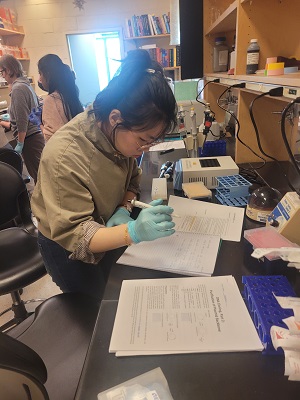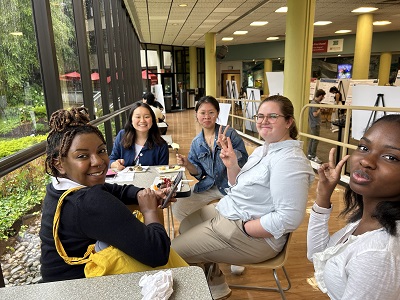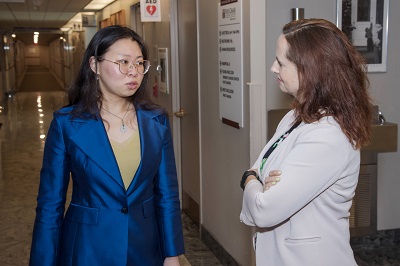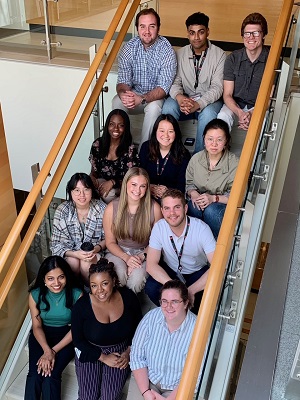Always Hold a Desire for the Unknown: Not Afraid to Learn New Things
June 17, 2023
When teenagers enter college, it represents the beginning of a new stage and a new level of life. At this time, young people are always full of unlimited fantasies about the future. I was one of the many young people who were both excited and nervous when I entered college. The future was both longed-for and unknown. But there was a great regret in my college career. During the year I was to enter college, Covid-19 started, forcing me to take a year and a half of online classes in China. I did not get to campus as I had hoped and did not live the college life I had imagined. I missed out on a lot of information and opportunities. When I entered campus in the fall of 2021, I found that I was behind. I was anxious and nervous and panicked and hastily chose chemistry as my major because I had always excelled in chemistry in high school. But I had neglected my true passion, the study of disease and health. By the end of the first half of my junior year, I realized that I had no involvement in the field of disease and health, and I was rushing through each semester taking credits, overly obsessed with my GPA, and full of anxiety and paranoia. I began to become emotionally unstable during that time and wanted to cry from time to time. When I felt I was too overwhelmed, my mother's words brought me some relief. She said, "I didn't send you to the U.S. expecting to see a 4.0 GPA, but I wanted to see you enjoy your studies and never give up on them. Find a field that you love and persevere in your studies. Don't think you're not smart enough; when you really enjoy learning, you'll find yourself far smarter than you thought."
During that summer, I decided to start really getting closer to the field I love. I entered Dr. Karl Schmitz’s lab, which is a lab that studies the Clp protease family in tuberculosis bacteria, focusing on protein structure. Before entering the lab, I was apprehensive; as a chemistry major, entering a biology lab was challenging as that meant a lot of unlearned knowledge. For me it meant a double challenge of language and knowledge itself. I spent the summer in the lab training and after a month I started to do experiments with my own hands. Slowly I found that I started to enjoy the experiments and the pleasure of going from not understanding to looking up information and figuring it out. What really made me discover that I loved experimenting was when I didn't lose my patience or confidence when a tag cleavage experiment repeatedly didn't work. After repeated failures and many attempts, my mentor and I finally succeeded. The excitement I felt after solving the problem was something I had not experienced before. I discovered that I loved problem solving. Soon after, I started to do experiments alone.
 In the second semester of my junior year, I was given the opportunity to visit the Fox Chase Cancer Center. This was an exciting opportunity for me, as I had been in a biostructure lab, but it was not strongly related to the field of disease and health. But the FCCC is an institution that specializes in cancer research, and the internship at the FCCC was a great opportunity to enter the field of disease and health research. Fortunately, I passed the application and interview and was officially admitted to the research program. The opportunity came with challenges, and again, it meant a lot of unknowns and learning.
In the second semester of my junior year, I was given the opportunity to visit the Fox Chase Cancer Center. This was an exciting opportunity for me, as I had been in a biostructure lab, but it was not strongly related to the field of disease and health. But the FCCC is an institution that specializes in cancer research, and the internship at the FCCC was a great opportunity to enter the field of disease and health research. Fortunately, I passed the application and interview and was officially admitted to the research program. The opportunity came with challenges, and again, it meant a lot of unknowns and learning.
I am looking forward to my internship at FCCC, where I hope to systematically learn about research methods in the disease area, be able to improve my experimental design skills, and hopefully expand my horizons. Likewise, I hope to be able to explore whether I am truly interested in research in the field of disease and health.
During the second week of my internship, I officially joined Dr. David Wiest's lab. His lab has a wide range of research. Dr. Wiest's humor made me feel less nervous and uncomfortable when I first entered the lab. My mentor Billy Turong's research focuses on the impact of the ERK2 pathway in the disease process of myelofibrosis leading to Leukemia. This is also the main direction of my summer research internship. I am very fortunate that Billy is a very good mentor and I see a lot to learn from him. His views on research, his experimental thinking, his experimental design methods and his planning of experimental life are all worth learning. I cherish the time I have spent studying under Billy. Of course, I also found that I am really interested in disease research. It is true that scientific articles are obscure, but as I read each article, my reading speed improved, and I became familiar with some scientific abbreviations. I no longer know nothing about graphs and charts like I did at the beginning.
It's all just beginning!
I started to enjoy my study at FCCC. I listened carefully to Billy's explanation of all the experimental methods, although I didn't understand everything, I would search and learn by myself, I would ask Billy again, and he would explain patiently many times. Fluorescence polarization assay is a quantitative assay for binding interactions, which I am also learning to use. I am just beginning my studies at FCCC and I look forward to learning more in the future. I am also confident in all new learnings.
You don’t have to be too entangled with the moment, nor need to be too worried about the future. When you have gone through something, the landscapes before your eyes would have been different from what they formerly looked like.
– Haruki Murakami
Clearer future planning
July 9, 2023
As I entered the FCCC, I began to experience things that I had never experienced before. On the last day of our training week, we listened to Dr. Chen’s presentation about his research project. As my first time hearing an accomplished researcher talking about his research project, I was very shocked and encouraged. He is a successful researcher and a very successful speaker. His presentation was very in-depth, but he did it in a simple way that we as undergraduate students could understand. I was struck by the fact that the ability to simplify extremely complex issues and make them understandable to non-researchers is an essential skill for researchers. Because in the end, the people who use the results of the research are the patients, and they are not very likely to be able to understand obscure research reports; they need simple and clear explanations. Through Dr. Chen's lecture, I learned not only the knowledge of medical science, but also the philosophy and purpose of medical science research, which is to serve patients with scientific results.
 The week before last week, we participated in Research Day. It was a very interesting event for researchers to talk about their research progress and learn from each other. I was really impressed by the passion of the researchers for their research projects, their spirit of research and their patience and tolerance for the non-specialist audience. I hope that one day I can be one of them and tell others about what I’m working on and my research achievements.
The week before last week, we participated in Research Day. It was a very interesting event for researchers to talk about their research progress and learn from each other. I was really impressed by the passion of the researchers for their research projects, their spirit of research and their patience and tolerance for the non-specialist audience. I hope that one day I can be one of them and tell others about what I’m working on and my research achievements.
After entering Dr. Wiest’s group, I went from being clueless at the beginning to having an understanding of what I was doing. I learned the about the ERK2 kinase pathway in the human body and the significance of the work I was doing. I started to gain confidence, which motivated and satisfied me a lot. I gradually started to look forward to going into the lab every day. During my free waiting time, I enjoyed watching others in the group do their experiments. The people in the group had different experimental habits, but there were always techniques that I could learn to improve efficiency.
In the past, I used to think about my future, I didn't have a definite answer about what I liked, and I often felt anxious. But now I have the answer, and I really like the direction of this biological research in medicine. I think it is very meaningful research – biomedical research helps patients suffer less and live longer. Although we still have a long way to go from basic science research to the clinic, I can still feel the significance of the research I am doing, and that makes me feel proud.
The summer's internship in FCCC was one of the best choices for me, as it helped me to clarify my hobbies and helped me to make sense of where I want to go in the future. I now enjoy doing experiments every day and feel confident that I can continue my studies and research in my favorite field in the future.
Every banquet must come an end
August 25th, 2023
 Two months flew by, and I went from being apprehensive about entering the program and the lab to getting used to the pace of the work, and now I am feeling very sad about the program coming to an end. During this fellowship, I have met many people, including PIs, very helpful PhD students, and of course some associate scientists. All of them provided indispensable help and guidance in the conduct of my project.
Two months flew by, and I went from being apprehensive about entering the program and the lab to getting used to the pace of the work, and now I am feeling very sad about the program coming to an end. During this fellowship, I have met many people, including PIs, very helpful PhD students, and of course some associate scientists. All of them provided indispensable help and guidance in the conduct of my project.
During my time in the program, I feel very fortunate to have been in Wiest lab for my fellowship and study. My project was to test D-domain inhibitors of the ERK2 protein kinase, as well as test the E3 ligase binding partner of ERK2 obtained from a computational model. My project consisted of two main approaches, FP assay and BLI assay. The D-domain inhibitors were tested to more specifically inhibit ERK2's role in driving cancer progression, while the E3 ligase acted as a protein degrader.
 The most rewarding part of this program is not only about the biological knowledge that I’ve learned during the experiments, but also more about the research attitude. More than once, I have been struck by how passionate scientists are about their subjects and scientific research. Their commitment to scientific problems, their change of perspective, and the diversity of their considerations have had a positive impact on the way I view science. I believe that because of their influence, my next foray into scientific research will be smoother since I will know what to expect.
The most rewarding part of this program is not only about the biological knowledge that I’ve learned during the experiments, but also more about the research attitude. More than once, I have been struck by how passionate scientists are about their subjects and scientific research. Their commitment to scientific problems, their change of perspective, and the diversity of their considerations have had a positive impact on the way I view science. I believe that because of their influence, my next foray into scientific research will be smoother since I will know what to expect.
This program was very valuable and important in that it helped me to redefine scientific research in a sense, appreciate it more deeply, and become more certain that I wanted to continue my in-depth scientific research after undergraduate school and attend graduate school. I am more grateful for the program than I can express in words, and I think it will help more young people to have a clear understanding of themselves and their goals for the future.